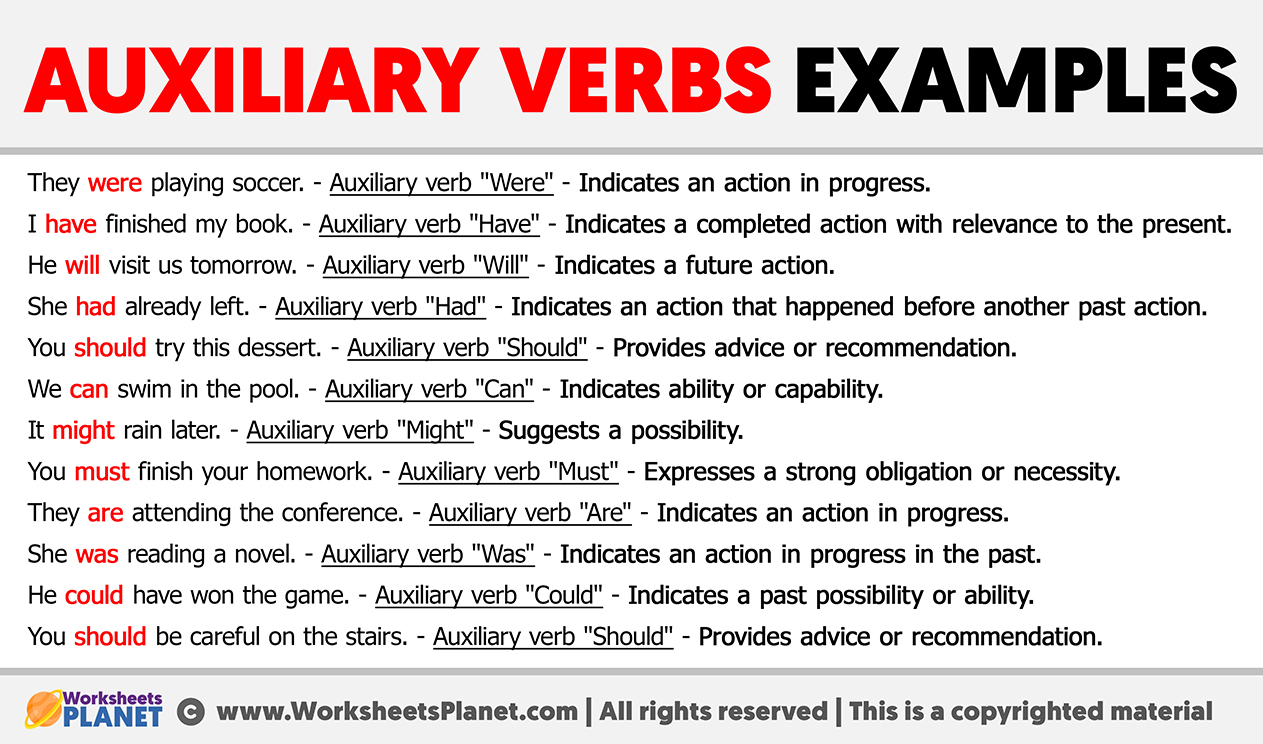An auxiliary verb, also called a helping verb, is a verb used alongside the main verb in a sentence to convey additional information about tense, aspect, mood, voice, or emphasis.
They assist in forming verb phrases, enabling the expression of complex grammatical structures and meanings.

Short Sentences with auxiliary verbs
- She is watching TV. – “Is” is an auxiliary verb that helps form the present continuous tense, indicating an action in progress.
- They have finished their homework. – “Have” is an auxiliary verb used in the present perfect tense to show a completed action with relevance to the present.
- I will go to the store. – “Will” is an auxiliary verb used to form the future tense, indicating a future action.
She had visited the museum before lunch. – “Had” is an auxiliary verb used in the past perfect tense, indicating an action that happened before another past action. - He should study for the test. – “Should” is an auxiliary verb expressing advice or obligation.
- They can swim very well. – “Can” is an auxiliary verb indicating ability or capability.
- She might join us for dinner. – “Might” is an auxiliary verb indicating a possibility.
- You must finish your work on time. – “Must” is an auxiliary verb indicating a strong obligation or necessity.
- We are going to the party. – “Are” is an auxiliary verb used in the present continuous tense, indicating an action in progress.
- He was reading a book when I called him. – “Was” is an auxiliary verb used in the past continuous tense, indicating an action that was happening at a specific time in the past.
- They will have dinner at 7 PM. – “Will” is an auxiliary verb used to form the future perfect tense, indicating an action that will be completed before a specified future time.
- She could have won the race. – “Could” is an auxiliary verb indicating a past possibility or ability.
- You should be careful while driving. – “Should” is an auxiliary verb expressing advice.
- I might attend the conference. – “Might” is an auxiliary verb indicating a possibility.
- He has been playing the piano for years. – “Has” is an auxiliary verb used in the present perfect continuous tense, indicating an action that started in the past and continues to the present.
- They were studying when the power went out. – “Were” is an auxiliary verb used in the past continuous tense, indicating an action that was happening at a specific time in the past.
- We will be traveling to Paris next week. – “Will” is an auxiliary verb used to form the future continuous tense, indicating an action that will be in progress at a specified future time.
- You may use my computer. – “May” is an auxiliary verb indicating permission or possibility.
- She has had a busy day. – “Has” is an auxiliary verb used in the present perfect tense, and “had” is used to form the past participle, together indicating a completed action with relevance to the present.
- He would have joined the team if he had been invited. – “Would” is an auxiliary verb indicating a conditional action, and “had” is used to form the past participle, together indicating a hypothetical past action.

